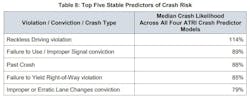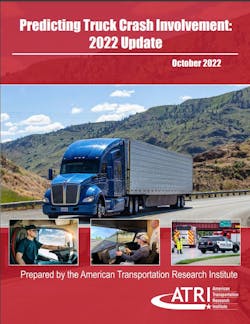ATRI report reinforces strong link between driver behavior, truck crashes
The American Transportation Research Institute (ATRI) on Oct. 11 released a 2022 update to its Predicting Truck Crash Involvement research, based on more than 580,000 individual truck driver records, that reinforces ATRI’s long-discovered finding of a strong link between unsafe driver behaviors such as failure to use turn signals, right-of-way violations, and erratic lane changes and future crashes.
ATRI’s crash predictor research was originally published in 2005, with updates in 2011 and 2018. This new report uses the same statistical methods as the prior research and identifies more than 25 different violations and convictions that increase the likelihood of future crashes, five of which increased future crash likelihood by more than 100%, according to an ATRI summary of its findings.
See also: Trucking endures 'costliest year ever,' ATRI reports
Having a previous crash increased a truck driver’s probability of having another one by 113%, which is 28.4% higher than the previous ATRI reports, according to the Oct. 11 summary.
According to 2021 data from the National Highway Traffic Safety Administration (NHTSA), 42,915 people died last year in motor vehicle crashes—a 10.5% increase from the 38,824 fatalities in 2020. Fatalities in crashes involving at least one large truck were up 13% last year. The projection is the highest number of fatalities since 2005 and the largest annual percentage increase in the Fatality Analysis Reporting System’s history, according to NHTSA. Data reported by the Federal Highway Administration shows that vehicle miles traveled in 2021 increased by about 325 billion miles, or about 11.2%, compared to 2020.
Behaviors with the strongest link to truck crashes
Five behaviors have consistently been strong indicators of future crash involvement across three or more of ATRI’s reports. They are: a reckless driving violation; a conviction for failure to use or improper use of turn signals; a prior crash; a failure to yield right-of-way violation; and a conviction for improper or erratic lane changes, according to the 2022 ATRI report.
The new crash predictor update includes several new analyses, including a safety comparison between 18- to 20-year-old truck drivers and those older than 24 years. The study finds drivers younger than 21 have statistically fewer crashes than those older than 24. It cautions, however, that “due to the small sample size of drivers under the age of 21 ... further research on young driver safety is necessary.”
A current federal effort, the Safe Driver Apprenticeship Program, is studying how younger drivers operate in interstate commerce. The Federal Motor Carrier Safety Administration (FMCSA) opened registrations for the under-21 driver pilot in July. They are prohibited from driving across state lines on the job, but the program will grant exemptions to under-21 drivers who participate. Up to 3,000 drivers between 18 and 20 and up to 1,000 motor carriers will be accepted into the program, which is backed by the U.S. Departments of Transportation and Labor and is part of the 2021 Infrastructure Investment and Jobs Act.
Eye-opening insights about gender in trucking
The new ATRI study also illuminates the problem of an aging driver population as it finds that the average trucker age has gone up from 43 in 2005 to 46 in 2022.
The report also revisits the safety of male drivers versus females, with female drivers continuing to be safer than their male counterparts. Women are driving trucks in greater numbers, but they account for less than 7% of the driver population, according to the new ATRI report, but as high as 12% in other studies. Women account for slightly more than 50% of the U.S. population.
The new ATRI Crash Predictor study found that males were 76% more likely to receive a seat-belt violation, 57% more likely to receive a conviction for driving too fast for conditions, 19% more likely to receive a conviction for speeding more than 15 miles per hour above the speed limit, and 14% more likely to be involved in a crash.
See also: Women in Transportation 2022: Trailblazers in trucking
Finally, the report includes an updated list of the 10 top states for truck safety, which are ranked by the relationship between traffic enforcement inspections and crashes. Washington state was the top-ranked state, followed by Indiana, New Mexico, Arizona, and Massachusetts. Three states joined the top-tier list for the first time: Massachusetts, Georgia, and Pennsylvania.
Only four states—Alaska, North Dakota, Vermont, and Wyoming—had fewer truck-involved crashes between the last ATRI report in 2018 and the new one, pointing to an increase overall in truck-involved mishaps and a need for more traffic enforcement. However, 10 states aren’t inspecting trucks as much: Hawaii, Alaska, South Dakota, Montana, New Hampshire, Kentucky, Connecticut, Missouri, New York, and Maryland, pointing to an enforcement gap.
“With the recent unexpected increase in truck-involved crashes in the U.S., it becomes more important than ever to understand both the underlying causes and attributes of these crashes as well as targeted strategies for mitigating the crashes,” ATRI’s 2022 Crash Predictor report concludes.
The report “provides important insight into truck driver behaviors and violations that generate a statistically significant likelihood of a future crash. The research [also] identifies additional driver and crash attributes such as age and gender that allow industry stakeholders to better target crash causes before they occur."
About the Author
Scott Achelpohl
Managing Editor
Scott Achelpohl is a former FleetOwner managing editor who wrote for the publication from 2021 to 2023. Since 2023, he has served as managing editor of Endeavor Business Media's Smart Industry, a FleetOwner affiliate.



